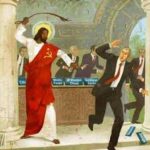 The daily routine at Heart Mountain Monastery doesn’t change much during the Christmas season-=- okay, the holiday season. That’s one reason why we get quite a few folks asking if they might come stay during this time. The ordinariness, and the lack of pressure, seems to be a real draw.
The daily routine at Heart Mountain Monastery doesn’t change much during the Christmas season-=- okay, the holiday season. That’s one reason why we get quite a few folks asking if they might come stay during this time. The ordinariness, and the lack of pressure, seems to be a real draw.
When I say our daily routine doesn’t change much, I’m not talking about a rigid or complex set of rituals or mandatory times for rising and eating and going to bed, which one often finds in monasteries “with walls.” Ours is first and foremost a monastery without walls. . We are very laissez-faire here. You might even call it the Lazy Fair. Each person— each monk or nun, each artist— is allowed, encouraged, to follow his or her own life art, at his or her own pace. Welcome to the freedom the spiritual lifestyle.
That said, we have mostly agreed about four basic modes for our daily routines that seem to support and encourage the highest lifestyle, art-style: 1.) daily tuning, 2.) daily creating, artistry in one genre or another; 3.) daily manual labor, or exercise; 4.) daily outreach, e.g., sharing our art, sharing our discoveries, with the wider world. .
Of course, the distinction between these four modes of activity is slight. Ideally, we are “tuning in” when we are creating, and when we are reaching out to others. And the reaching out is a form of a manual labor, etc. etc. In other words, we endeavor to do all four modes at the same time, though few of us are so skilled. Thus, our routine of devoting specific time each day to these activities. (See “Monk routine” category for more thoughts on this matter.)
Just a quick word about daily tuning: It seems reasonable that every monk or nun would be interested in spending at least a little time each day in prayer and meditation. We are, after all, a monastery, even if a monastery without walls. We have found that it is sometimes useful to pray and meditate together, but most often we each do this in our own way, in our own time. (95% of the monks and nuns associated with HMM are “householder” monks and nuns–= living in our own suburban or urban homes and apartments, doing our own thing on our own time schedule.) Our general term for prayer and mediation is “tuning.” Prayer and meditation are such loaded terms, they turn off many people. (A healthy percentage of the HMM monks and nuns consider themselves atheist or agnostic.) Basically what we are doing is tuning to what we call WIGO, or What is Going On. within and without. In a word, we’ve been led to the monastic life style, at least in part, because we’ve noticed, there’s quite a miracle—quite a mystery— quite a circus of art and wonderment going on here, both within and without. Rather than being constantly caught up in our own little amusements and problems, we sense it might be a good idea to consciously, intentionally, tune into WIGO, in one way ore another, just so we don’t keep bumping into the walls. Prayer and mediation are the traditional terms used for “tuning in.” This is not a part-time practice, though we’ve found that setting aside at least a little dedicated time each day for “tuning in” seems quite beneficial.
Most of us most of the time do our tuning first thing in the morning—often with a cup of coffee, and just as often with good reading, or particular yoga routines, or chanting or singing or traditional and non-traditional prayers and, yes, meditation. Learning how best to tune is a very personal pilgrimage.
As mentioned, along with tuning, , we encourage artistic expression— every day, six days a week. (Even God– Mr. And Mrs WIGO– took the seventh day off. ) It’s a bit like breathing. First tune— take in WIGO, feel the mystery, the creative presence— inhale. And then exhale, create some little thing, or big thing, or something in between.
“The real reason we don’t change our routines much when Christmas rolls around,” the Abbot recently mentioned at one of our Wednesday potlucks, “is because —at least ideally, — every day is Christmas here. Every day the Christ is born again in us, every day we are bringing, seeing, witnessing heaven being born again on earth.”
“That’s a nice sentiment,” Linda Durst said, “but I confess, one of the reasons I like to come here during the Christmas season is because every day out in the world feels more like Good Friday. The Christ in me gets crucified, hung up to dry and die, time and time again.”
We all laughed, and could dig it.
“And I confess, I have a fairly big problem with the word Christ,” Larry West said. “And that’s one of the reasons I like to hide our here, during the holidays. First, I’m Jewish– or at least I was brought up Jewish. And then, well, so much blood has been shed in the name of Christ, so much misery, so much divisiveness, not only within families, but within and between whole societies. I do have problems with that word ”
Most of us nodded our head in agreement.
“Yea, if Jesus could see what people are doing in his name,” old Bones chimed in, “He would probably turn over in his grave.” Most of us chuckled. Louise Solo, sitting next to him, slapped Bones on the arm.
“When I talk about Christ,” the Abbot said, “I talk about the inextinguishable flame of life that is present in everybody. The Hindus call it the atman. It’s the spark of life that is in you, me, everybody, even after we drop the body. The spark may be pure, individual consciousness itself.”
“So maybe for convenience, and to be more politically correct,” Bones said, “instead of Christ, which is such a loaded term, let’s just call it Sparky.”
Again, most of us laughed, and agreed.
“So we’ll have the Sparkyness Season, rather than the Christmas Season?” Shelly asked. “And then we’ll celebrate Sparkyness Day?”
“Yes, yes, I’m in, ” Jim Bancroft laughed. And then he broke into song. “Have yourself a merry little Sparkynesss. . . .”
For a while, we all had a good time substituting “Sparkyness” for Christmas. Sparkyness sales. Sparkyness vacation. Sparkyness bonuses. Sparkyness gifts. Sparkyness cheer. After a while, the craziness of it went away and we quieted down. We could tell that the Abbot, mostly silent, was thinking on a different level.
“Are you offended by all this? ” Louise asked. “Does substituting ‘Sparky’ for Christ upset you?”
“Not a bit,” the Abbot said. “The Christ, the Sparky, is an experience, a presence, that can not be confined by words. If and when we consciously recognize Sparky in our consciousness, or maybe as our consciousness, we hold to this recognition every day, we are no longer confined to the traditions of our forefathers, the somewhat sad Christian tradition. When we prioritize our relationship with Sparky— which, I understand is another name for love– we have set up the conditions for a non-violent, ever more wondrous revolution. Following Sparky, we can begin to overthrow the misery and suffering of the world, and bring heaven to earth. Isn’t that what the tradition says happened? Heaven came to earth? So, following the inner spark, we would no longer feel the need to go to war. We would no longer follow unhealthy or unjust corporate orders, just because they come from above. We would know that life itself gives abundance. When we pay attention to Sparky, heaven appears again on earth.”
“Did you say Sparky is another name for Love?” Jeannie asked.
“Yes of course,” the Abbot said. “But let’s take it further. When we have sparkinesss alive in us—when we recognize that sparkiness is alive in us, it is our own daily consciousness — we no longer see national borders. We see all people on earth as equal recipients of sparkiness, equal vessels of spaarkinesss, of consciousness. With Sparky, we are first and foremost citizens of the earth, or even more, citizens of the universe. Only secondarily are we citizens of particular countries. We refuse to participate in the oppression or exploitation of our brother and sister sparks. We recognize ourselves as the same fire, the same light, the same consciousness, the same life. Seeing Sparky, we see heaven on earth, within and without, everywhere we look.”
The Abbot’s words brought a hush to the room. He continued, and summed up:
“Merry Sparkyness can be our daily motto. Isn’t that what Jesus himself would have wanted?”

Recent Comments